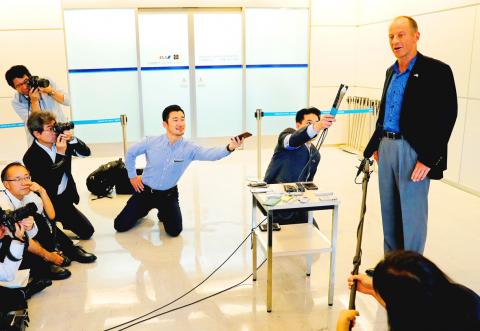South Korea has warned the US of the potential damage from “undesirable” Japanese restrictions on exports of high-tech material to South Korea, as a trade row between the two nations intensifies.
As South Korea sought US help in the dispute, triggered by a disagreement over the issue of compensation for South Koreans forced to work for Japanese firms during World War II, it also took steps to limit the damage to its companies.
South Korea announced that up to 300 billion won (US$255.6 million) would be included in a supplementary budget to cope with Japan’s curbs on exports of three materials crucial for advanced consumer electronics by speeding supply localization.

Photo: Reuters
The Democratic Party said about one-third of the proposed budget would be for supporting South Korean materials and equipment makers to help them get their products to market.
S&P Global Rating Asia-Pacific chief economist Shaun Roache said the dispute is as unpredictable as the US-China trade dispute and is likely to affect South Korea’s growth.
The Japanese restrictions are to affect companies such as Samsung Electronics Co Ltd and SK Hynix Inc, which supply chips to companies such as Apple Inc.
South Korean Minister of Foreign Affairs Kang Kyung-wha late on Wednesday told US Secretary of State Mike Pompeo in a telephone call that Japan’s restrictions might not only damage South Korean companies, but could also disrupt the global supply chain and hurt US firms.
Kang “expressed concern that this is undesirable in terms of friendly relations between South Korea and Japan, and trilateral cooperation among South Korea, the US and Japan,” the South Korean Ministry of Foreign Affairs said in a statement.
South Korea hoped Japan would withdraw the curbs and that the situation would not deteriorate further, it said.
Pompeo said he understood and they agreed to strengthen communication between the three sides, it said.
However, analysts say the US is unlikely to become a mediator.
South Korea and Japan also clashed at the WTO this week.
South Korean National Security Office Deputy Director Kim Hyun-chong arrived in Washington on Wednesday and told reporters he would meet officials from the White House and US Congress to discuss issues that included Japan’s export curbs.
Meanwhile, New US Assistant Secretary of State for East Asian and Pacific Affairs David Stilwell arrived in Japan on the first stop of a 10-day visit to Asia.
He is also scheduled to visit South Korea next week, but did not mention the dispute when he spoke to reporters.
He did say that he was looking forward to talking with Japanese officials about subjects including Iran and North Korea.
“I look forward to some interaction with senior Japanese officials, understanding where we sit today in the free and open Indo-Pacific strategy, as well as discussing topics like Iran and North Korea,” Stilwell told reporters after arriving at Narita International Airport near Tokyo.
Stilwell’s post had been vacant for more than two years, despite major challenges in the region.
He is scheduled to meet senior Japanese diplomatic and defense officials until Sunday, before traveling to the Philippines, South Korea and Thailand.

Right-wing political scientist Laura Fernandez on Sunday won Costa Rica’s presidential election by a landslide, after promising to crack down on rising violence linked to the cocaine trade. Fernandez’s nearest rival, economist Alvaro Ramos, conceded defeat as results showed the ruling party far exceeding the threshold of 40 percent needed to avoid a runoff. With 94 percent of polling stations counted, the political heir of outgoing Costa Rican President Rodrigo Chaves had captured 48.3 percent of the vote compared with Ramos’ 33.4 percent, the Supreme Electoral Tribunal said. As soon as the first results were announced, members of Fernandez’s Sovereign People’s Party

EMERGING FIELDS: The Chinese president said that the two countries would explore cooperation in green technology, the digital economy and artificial intelligence Chinese President Xi Jinping (習近平) yesterday called for an “equal and orderly multipolar world” in the face of “unilateral bullying,” in an apparent jab at the US. Xi was speaking during talks in Beijing with Uruguayan President Yamandu Orsi, the first South American leader to visit China since US special forces captured then-Venezuelan president Nicolas Maduro last month — an operation that Beijing condemned as a violation of sovereignty. Orsi follows a slew of leaders to have visited China seeking to boost ties with the world’s second-largest economy to hedge against US President Donald Trump’s increasingly unpredictable administration. “The international situation is fraught

MORE RESPONSIBILITY: Draftees would be expected to fight alongside professional soldiers, likely requiring the transformation of some training brigades into combat units The armed forces are to start incorporating new conscripts into combined arms brigades this year to enhance combat readiness, the Executive Yuan’s latest policy report said. The new policy would affect Taiwanese men entering the military for their compulsory service, which was extended to one year under reforms by then-president Tsai Ing-wen (蔡英文) in 2022. The conscripts would be trained to operate machine guns, uncrewed aerial vehicles, anti-tank guided missile launchers and Stinger air defense systems, the report said, adding that the basic training would be lengthened to eight weeks. After basic training, conscripts would be sorted into infantry battalions that would take

GROWING AMBITIONS: The scale and tempo of the operations show that the Strait has become the core theater for China to expand its security interests, the report said Chinese military aircraft incursions around Taiwan have surged nearly 15-fold over the past five years, according to a report released yesterday by the Democratic Progressive Party’s (DPP) Department of China Affairs. Sorties in the Taiwan Strait were previously irregular, totaling 380 in 2020, but have since evolved into routine operations, the report showed. “This demonstrates that the Taiwan Strait has become both the starting point and testing ground for Beijing’s expansionist ambitions,” it said. Driven by military expansionism, China is systematically pursuing actions aimed at altering the regional “status quo,” the department said, adding that Taiwan represents the most critical link in China’s